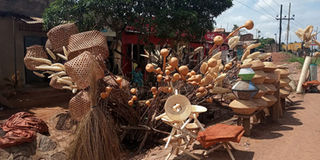Mpigi women make crafts for a living

Business. Some of the items that the women sell in Lungala Village, Mpigi District. Photo by Sadat Mbogo
Women in Lungala Village, Mpigi Town Council in Mpigi District are eking a living out of selling locally-made crafts such as sponges, baskets, stools and mats.
Ms Annet Kafeero, who sells loofah sponges, says she has been able to raise school fees for her children.
“Together with selling other items like small and big baskets, calabash, brooms and backcloth, I get money to pay school fees for my children at one of the private secondary schools in Katende,” Ms Kafeero says.
She adds that a set of loofah sponges of three pieces goes for Shs5,000, baskets costs between Shs10,000 to Shs25,000 depending on its size, plain stools go for Shs5,000 and the coloured stools at Shs8,000.
Other items such as calabash are sold at Shs2,000 and Shs5,000 depending on their sizes. Brooms go for Shs1,000 and mats sell between Shs10,000 to Shs60,000 depending on their quality.
Some of the traders sell the products in stalls on Kampala-Masaka highway. Mr Joseph Ssengendo, the village chairperson, says the traders have also been able to construct permanent structures using proceeds from the local products.
“You may find one with a house or plot of land but when you ask for the source of that money, she will tell you that it was earned from selling loofahs, baskets and other items,” he says. Mr Ssengendo says one needs to be confident and determined to work to start such a business because it also faces challenges.
“People undermine this business because they see it as traditional but one has to first understand that no one shall bring food to his or her home on a silver plate. Let them work despite the criticism. Eventually, they will reap big. Fortunately, youth have also joined the business, it requires a small capital,” he says.
One of the challenges, Ms Fatumah Nalukenge, a resident, notes is that their business is seasonal.
“During holidays and last months of the year, there are a lot of adventures, travels and ceremonies. During low seasons, we earn about Shs20,000 per day and sometimes, there are no clients,” Ms Nalukenge says.
High transport costs
“We supplement our income by selling items such as tomatoes, onions and bananas, among others. These contribute to the welfare of many families,” she adds.
The women also incur high costs in transporting their raw materials. They travel to Nkonge, Maziba, Mulole, Ggala, Kkoola, Bunnamwezi, Kisozi, Kitafujja and Kikamula to get raw materials.
“We need government support, especially if they help us construct a modern market. We incur huge losses due to heavy rain and sunshine. We also lack good storage facilities,” Ms Josephine Nabasitu, trader, says.



